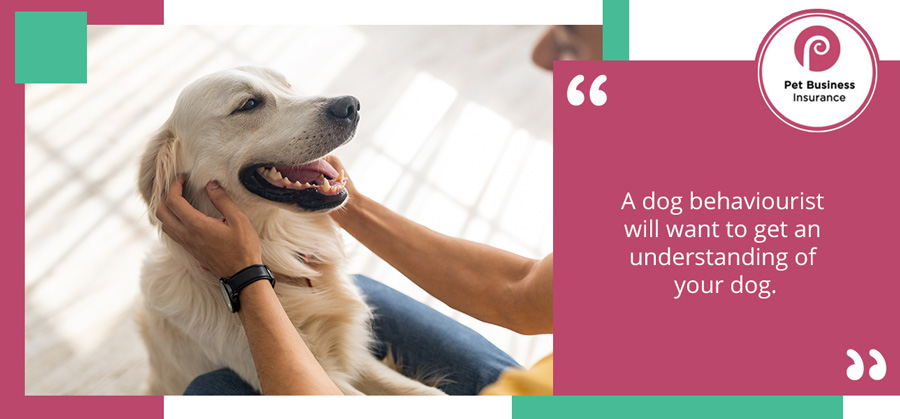
If you have a dog, it goes without saying that they will be a significant part of your life. However, if they exhibit behavioural issues, it can be hard work. Getting professional advice is a good first step – but should you seek help from a dog trainer or dog behaviourist?
What does a dog trainer do?
Dog trainers use various types of dog training methods to teach, encourage and reward obedient behaviour. They can help you teach your dog to obey a variety of important vocal commands, which could include:
- sitting on command
- coming when called (often described as ‘recall’)
- lying down on request
- leaving food when told
- walking quietly to heel.

Why do I need to train my dog?
Commands which elicit obedient responses like those above can be essential for both your comfort and safety, and that of other people and their dogs.
Consider a situation outdoors where you encounter another person – maybe a horse rider or a cyclist – while your dog is off the lead. You’ll need to recall your dog so they can go back on the lead.
The ability to do this quickly and consistently can prevent a dangerous situation arising. You don’t want your dog running between the legs of a horse or into the path of a moving vehicle. A dog that pulls suddenly on a lead could also potentially pull you over.
What does a dog behaviourist do?
Sometimes your dog’s behaviour may not be wholly attributed to a lack of obedience training. For example, if they appear to snap at other dogs for no reason, steal food or repeatedly damage furniture.
A dog behaviourist may help in these situations. They may also be a dog trainer, but will usually have additional qualifications and experience in understanding canine behaviour and psychology, what causes certain behaviours, and how to deal with them.

The dog behaviourist may begin by asking you to take your dog to the vet to check there isn’t an underlying causal problem, such as a painful undiagnosed injury which may make the dog ‘snappy’ when it is touched.
They will also want to get an understanding of your dog. This may require you to answer a series of questions; e.g:
- How long have you had the dog?
- Are there certain things that trigger the behaviour?
- What life experiences has your dog had?
With a detailed history, a dog behaviourist will be better able to get to the root of the problem. For example, a dog that barks incessantly may be bored because it’s been left at home on its own for too long, or there may be something making it anxious.
Once the dog behaviourist has identified the problem, they should suggest a solution and work with you to gradually improve behaviour. Like dog training, the results you want won’t occur immediately; it will take time and consistency for the effort to bear fruit.

Is there an overlap between a dog behaviourist and a dog trainer?
There is some overlap, but both will normally be happy to advise you about recommended approaches. Both professions are also great career options if you love working with dogs and solving problems.
If you’re thinking of becoming a dog trainer or behaviourist, it’s worth carrying out research into what qualifications and experience you’ll need.
Dog trainer and animal behaviourist insurance
All dog trainers and behaviourists should have adequate dog trainer and animal behaviourist insurance.
As an insurer with nearly two decades of experience in insuring small- and medium-sized pet businesses, Pet Business Insurance is the perfect choice when arranging cover for skilled professionals working in either sector.
In addition to covering your liability for damage or injury caused to third parties, and claims arising from accidents or injuries to animals in your care, we also provide protection for occupation-specific risks, such as a client’s dog being lost or stolen.
Optional cover is also available if needed, such as professional indemnity insurance in case you provide a client with negligent training or behavioural advice.
To discuss your dog training and behaviourist insurance requirements, get in touch with Pet Business Insurance today. Call 01284 736 874, or complete our online enquiry form.